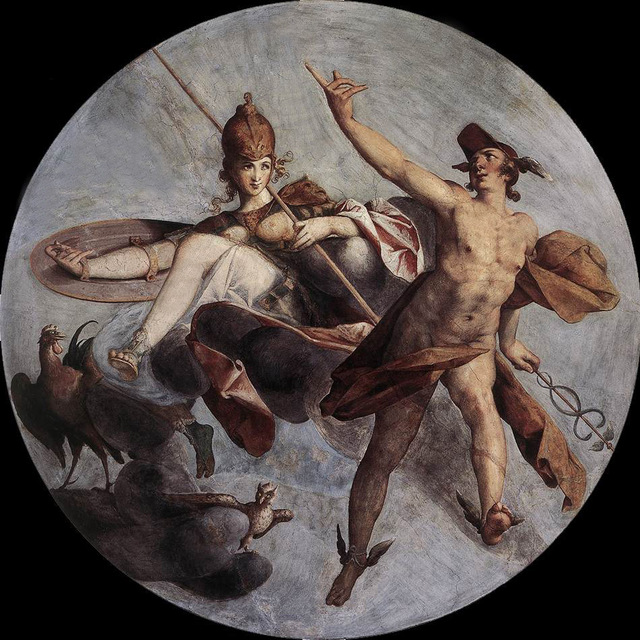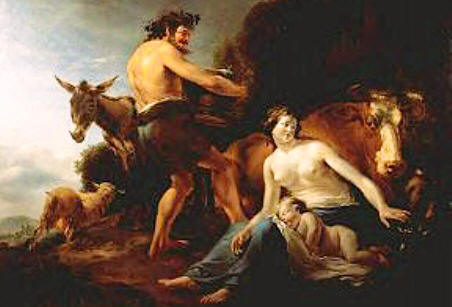WHEN Hermes was born on Mount Cyllene his mother Maia laid him in swaddling bands on a winnowing fan, but he grew with astonishing quickness into a little boy, and as soon as her back was turned slipped off and went looking for adventure. Arrived at Pieria, where Apollo was tending a fine herd of cows, he decided to steal them. But, fearing to be betrayed by their tracks, he quickly made a number of shoes from the bark of a fallen oak and tied them with plaited grass to the feet of the cows, which he then drove off by night along the road. Apollo discovered the loss, but Hermes’s trick deceived him, and though he went as far as Pylus in his westward search, and to Onchestus in his eastern, he was forced, in the end, to offer a reward for the apprehension of the thief. Silenus and his satyrs, greedy of reward, spread out in different directions to track him down but, for a long while, without success. At last, as a party of them passed through Arcadia, they heard the muffled sound of music such as they had never heard before, and the nymph Cyllene, from the mouth of a cave, told them that a most gifted child had recently been born there, to whom she was acting as nurse: he had constructed an ingenious musical toy from the shell of a tortoise and some cow-gut, with which he had lulled his mother to sleep.
b. ‘And from whom did he get the cow-gut?’ asked the alert satyrs, noticing two hides stretched outside the cave. ‘Do you charge the poor child with theft?’ asked Cyllene. Harsh words were exchanged.
c. At that moment Apollo came up, having discovered the thief’s identity by observing the suspicious behaviour of a long-winged bird entering the cave, he awakened Maia and told her severely that Hermes must restore the stolen cows. Maia pointed to the child, still wrapped in his swaddling bands and feigning sleep. ‘What an absurd charge she cried. But Apollo had already recognized the bands. He picked Hermes, carried him to Olympus, and there formally accused him theft, offering the bands as evidence. Zeus, loathing to believe that his own new- born son was a thief, encouraged him to plead not guilty, but Apollo would not be put off and Hermes, at last, weakened confessed.
‘Very well, come with me,’ he said, ‘and you may have your herd. I slaughtered only two, and those I cut up into twelve equal portio as a sacrifice to the twelve gods.’
‘Twelve gods?’ asked Apollo. ‘Who is the twelfth?’
‘Your servant, sir,’ replied Hermes modestly. ‘l ate no more than my share, though I was very hungry, and duly burned the rest.’
Now, this was the first flesh-sacrifice ever made.
d. The two gods returned to Mount Cyllene, where Hermes greet his mother and retrieved something that he had been hidden underneath sheepskin.
‘What have you there?’ asked Apollo.
In answer, Hermes showed his newly-invented tortoise-shell lyre and played such a ravishing tune on it with the plectrum he had also invented, at the same time singing in praise of Apollo’s nobility, intelligence, and generosity, that he was forgiven at once. He led then surprised and delighted Apollo to Pylus, playing all the way, there gave him the remainder of the cattle, which he had hidden it cave.
‘A bargain!’ cried Apollo. ‘You keep the cows, and I take the lyre.” ‘Agreed,’ said Hermes, and they shook hands on at.
e. While the hungry cows were grazing, Hermes cut reeds, made them into a shepherd’s pipe, and played another tune. Apollo, again delighted, cried: ‘A bargain! If you give me that pipe, I will give you this golden staff with which I herd my cattle; in future you shall be the god of all herdsmen and shepherds.’
‘My pipe is worth more than your staff,’ replied Hermes. ‘But I will make the exchange, if you teach me augury too, because it seems to be a most useful art.’
‘I cannot do that,’ Apollo said, ‘but if you go to my old nurses, the Thriae who live on Parnassus, they will teach you how to divine from pebbles.’
f. They again shook hands and Apollo, taking the child back to Olympus, told Zeus all that had happened. Zeus warned Hermes that henceforth he must respect the rights of property and refrain from telling downright lies; but he could not help being amused.
‘You seem to be a very ingenious, eloquent, and persuasive godling,’ he said.
‘Then make me your herald, Father,’ Hermes answered, ‘and I will be responsible for the safety of all divine property, and never tell lies, though I cannot promise always to tell the whole truth.’
‘That would not be expected of you,’ said Zeus, with a smile. ‘But your duties would include the making of treaties, the promotion of commerce, and the maintenance of free rights of way for travellers on any road m the world.’ When Hermes agreed to these conditions, Zeus gave him a herald’s staff with white ribbons, which everyone was ordered to respect; a round hat against the rain, and winged golden sandals which carried him about with the swiftness of wind. He was at once welcomed to the Olympian family, whom he taught the art of making fire by the rapid twirling of the fire-stick.
g. Afterwards, the Thriae showed Hermes how to foretell the future from the dance of pebbles in a basin of water; and he himself invented both the game of knuckle-bones and the art of divining by them. Hades also engaged him as his herald, to summon the dying gently and eloquently, by laying the golden staff upon their eyes.
h. He then assisted the Three Fates in the composition of the Alphabet, invented astronomy, the musical scale, the arts of boxing and gymnastics, weights and measures (which some attribute to Palamedes), and the cultivation of the olive-tree.
i. Some hold that the lyre invented by Hermes had seven strings; others, that it had three only, to correspond with the seasons, or four to correspond with the quarters of the year, and that Apollo brought the number up to seven.
j. Hermes had numerous sons, including Echion the Argonauts’ herald; Autolycus the thief; and Daphnis the inventor of bucolic poetry. This Daphnis was a beautiful Sicilian youth whom his mother, a nymph, exposed in a laurel grove on the Mountain of Hera; hence the name given him by the shepherds, his foster parents. Pan taught him to play the pipes; he was beloved by Apollo, and used to hunt with Artemis, who took pleasure in his music. He lavished great care on his many herds of cattle, which were of the same stock as Helius’s. A nymph named Nomia made him swear never to be unfaithful to her, on pain of being blinded; but her rival, Chimaera, contrived to seduce him when he was drunk, and Nomia blinded him in fulfilment of her threat. Daphnis consoled himself for a while with sad lays about the loss of sight, but he did not live long. Hermes turned him into a stone, which is still shown at the city of Cephalenitanum; and caused a fountain called Daphnis to gush up at Syracuse, where annual sacrifices are offered.
1. The myth of Hermes’s childhood has been preserved in a late literary form only. A tradition of cattle raids made by the crafty Messenians on their neighbours, and of a treaty by which these were discontinued, seems to have been mythologically combined with an account of how the barbarous Hellenes took over and exploited, in the name of their adopted god Apollo, the Creto-Helladic civilization which they found in Central and Southern Greece- boxing, gymnastics, weights and measures, music, astronomy, and olive culture were all pre- Hellenic-and learned polite manners.
2. Hermes was evolved as a god from the stone phalli which were local centres of a pre- Hellenic fertility cult-the account of his rapid growth may be Homer’s playful obscenity- but also from the Divine Child of the pre-Hellenic Calendar; from the Egyptian Thoth, God of intelligence; and from Anubis, conductor of souls to the Underworld.
3. The heraldic white ribbons on Hermes’s staff were later mistaken for serpents, because he was herald to Hades; hence Echion’s name. The Thriae are the Triple-Muse (‘mountain goddess’) of Parnassus, their divination by means of dancing pebbles was also practised at Delphi (Mythographi Graeci: Appendix Narrationum). Athene was first credited with the invention of divinatory dice made from knuckle-bones (Zenobius: Proverbs), and these came into popular use; but the art of augury remained an aristocratic prerogative both in Greece and at Rome. Apollo’s ‘long-winged bird’ was probably Hermes’s own sacred crane; for the Apollonian priesthood constantly trespassed on the territory of Hermes, an earlier patron of soothsaying, literature, and the arts; as did the Hermetic priesthood on that of Pan, the Muses, and Athene. The invention of fire-making was ascribed to Hermes, because the twirling of the male drill in the female stock suggested phallic magic.
4. Silenus and his sons, the satyrs, were conventional comic characters in the Attic drama; originally they had been primitive mountaineers of Northern Greece. He was called an autochthon, or a son of Pan by one of the nymphs (Normus: Dionysiaca; Aelian: Varia Historia).
5. The romantic story of Daphnis has been built around a phallic pillar at Cephalenitanum, and a fountain at Syracuse, each probably surrounded by a laurel grove, where songs were sung in honour of the sightless dead. Daphnis was said to be beloved by Apollo because he had taken the laurel from the orgiastic goddess of Tempe.


Comments
Post a Comment